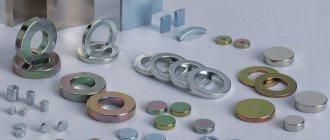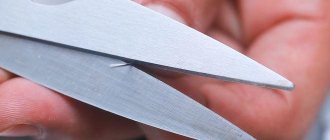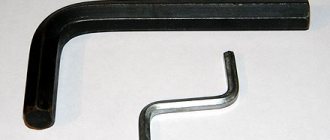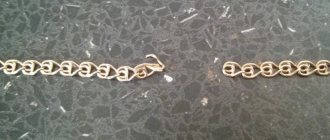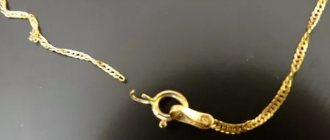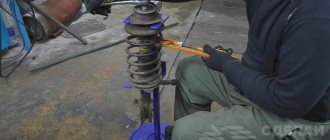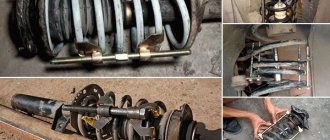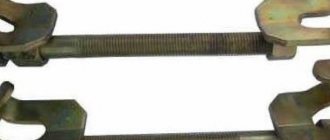Sometimes it is necessary to compress the suspension spring without removing it from the car. For this you need zip ties. In a simple case, two or more rods equipped with so-called hooks can serve as ties. The hooks with their hooks cling to the spring from the outside. All ties are usually placed on opposite sides of the spring. And then, by turning the threaded rods with a wrench, you can easily perform compression.
Branded spring tensioners
Of course, there is special equipment used when repairing cars of a certain brand. To compress springs, however, universal ties are more often used. The appearance of these devices is shown in the figure:
Branded spring ties
It is clear that a set of universal zip ties can be bought in a store. However, the cost of such equipment is higher than the price of all the components in total.
Design features and principle of operation of spring tensioners
In order to tighten the spring, it is necessary to apply force to the outer coils. You can perform this action in several ways:
- Using a threaded connection (similar to screw type jacks).
- Using a hydraulic cylinder.
- Modern tools use the latter method to tighten springs.
The simplest screed model consists of three elements:
- a rod with a thread applied to it,
- spring grip with thread or nut,
- additional grip under the spring.
The stop with a nut or thread, being twisted, approaches the stop that maintains a static position, as a result of which the spring is compressed. As an alternative to a threaded rod, a modified telescopic or hydraulic cylinder system can be used in the tie design. The hydraulic cylinder type is used primarily in professional grade ties.
We cook the screeds ourselves
In general, it makes sense to make shock absorber spring ties yourself. How to do this is discussed further.
Four nuts and two threaded rods
The metal products listed below are easy to find in almost any supermarket. For example, you can buy two M16 threaded rods. You will also need four extended nuts, as well as a steel plumbing pipe. Its internal diameter is 16-16.5 mm.
The end result is what is shown in the pictures. You will also need a steel rod, which is used to make reinforcement. Let's look at how screeds are made:
- Two identical cylinders are cut from the pipe, the length of which is 80-120 mm;
- Threaded rods can be shortened if necessary;
- 8 rods approximately 30 cm long are made from reinforcement;
- Using any bending equipment, the rods are bent to obtain hooks;
- Four rods are welded to two nuts, another four - to pipe sections;
- The set of components is completely ready for use at this stage.
It is easier to weld by placing the workpieces on a plane. The essence of these words is illustrated by the picture:
How to weld hook rods
Actually, what follows is a film where the technology is shown “inside and out”. The author even solved the problem with the lack of a bending machine: to bend one rod, you need two similar rods welded to a steel profile.
If the reader thinks that using welding is difficult, then it is better not to take risks. Welded joints can withstand significant loads, but only if they are performed according to all the rules. Spring ties can be made without welding. A suitable drawing is given below.
Two ties in 10 minutes (video)
Required material and tools
To make a screed yourself, you will need a metal rod (reinforcement), two threaded rods (M16), as well as extended nuts and a metal tube with an internal diameter of 16 mm. This will be quite enough to make a full-fledged screed.
It is also advisable to have a grinder on hand for cutting reinforcement and several wrenches for the nuts. The set of tools is minimal; all this can be found in the garage of any motorist. Well, now let's take a closer look at the process of assembling the product.
How should the spring be tightened?
Let's list the steps involved in tightening the shock absorber springs yourself. Everything looks simple:
- When the body is supported by a jack, two ties are brought to the spring from opposite sides;
- By rotating the nuts with your hands, you achieve confident engagement of the hooks and springs;
- Using a wrench, the nuts on different rods are rotated in turn;
- It is better to play it safe and secure the compressed spring with straps or wire.
Video of spring tensioners on shock absorber
No explanation required here. The result is shown in the photo.
Spring compressed by ties
When using homemade and even purchased equipment, follow these simple tips:
- Before using ties, threaded connections are lubricated with cyatim or grease;
- The ties cannot be removed from the compressed spring, even if it is additionally fixed;
- When carrying out work, exercise maximum caution. It is better to sacrifice body parts than your own health.
Features of the suspension of Lifan cars are discussed in these articles:
Some practical tips
When working with a factory product or a homemade device, you must:
- Threaded connections must be lubricated with grease or cyatim. Ciatim-201 lubricant is not cheap. Therefore, in order to save money, it is mixed with machine oil. The proportion is 50/50.
- When compressing the working structure, it is prohibited to remove the screed, even if additional fixation measures have been taken.
- While working, you must be constantly alert and careful. It is better to sacrifice body parts than your own health or even life.
At home, working with your hands, you can use various devices to compress springs. For example, clamping the work material in a vice. All methods to achieve the final result are good. The main thing is to follow safety precautions and not join the ranks of injured “home spill” specialists!
Analysis of the options will make it possible to choose the most appropriate method. This will allow you to fully enjoy the creative process and increase your own self-esteem. We are not talking about the obvious fact - saving the family budget.
Knowing how to make a spring remover, let’s consider the screeding process itself. Let's figure out what it actually is.
Drawings of universal threaded ties
Let's return to the question of how to make a device for tightening shock absorber springs yourself. Below is the appearance of the finished devices:
Factory-made threaded ties
On one side of the rod there is a left-hand thread, on the other - a right-hand thread. The standard thread pitch is M18. But buying threaded rods is not enough here. And to cut the thread yourself, you will need special equipment.
Drawings of the components that make up the entire structure are shown here:
Threaded tie (3 parts)
To make parts, you need a lathe, drilling and, probably, milling machine. It may be easier to contact a workshop. Print the drawing by downloading it from the website.
Most likely, there are no other drawings of universal ties on the Internet. And what is shown above is taken from a book on repairing domestic cars. You can use it.
Let's say the ties were made according to the drawings and all the parts fit together. But even then the advice about using lubricant remains valid. You need to take solid oil or cyatim and apply this material to the threads of the nuts.
Packaging cyatim-201, 20 gr.
Cyatim-201 lubricant is a rather expensive material. You can reduce consumption by mixing it with machine oil in a 50/50 ratio. Good luck.
Source: lifanovod.ru
Renault Megane II color D11 › Logbook › Device for compressing strut springs.
The supports, support bearings and springs of the front struts will need to be replaced. A long time ago I disassembled the strut with VAZ spring clamps - I was exhausted. I wanted to build something with a jack as a drive, but I came across this video:
Everything ingenious is simple! Today I assembled a similar device from scraps.
The only thing is that I didn’t have such a powerful corner as in the video in the scraps, I used what I didn’t mind - a corner from the frame of an armored bed. 40th. I think it will be enough for passenger car racks.
Shock absorber spring tensioner
Quite often it happens that the shock absorbers on a car wear out or fail. This is not surprising, and there can be many reasons for such consequences. In this case, every car owner is faced with a number of troubles and the only solution may be to replace the shock absorbers.
You can do this at a service center or in your garage, but this will require spring tensioners (some call them shock absorber coils), which require a special puller, as well as some knowledge and skills.
Conclusion
The process of tightening shock absorber springs is a measure that every driver faces who wants to repair shock absorbers with his own hands, rather than take his “iron horse” to a car service center. However, without a puller, it is not that it is completely impossible to carry out this operation, but it will be accompanied by a lot of difficulties and a fairly high risk for a person. If you use such a simple and inexpensive device for screeding, the risk is immediately minimized, and the work process itself becomes easy and quick.
How does a shock absorber work?
A mandatory component of every shock absorber is a spring. There are now all sorts of progressive types of this mechanism, such as oil or pneumatic, but the design of each of them includes the same spiral element, which helps to maintain a given level of the car above the ground, and also facilitates work when there is a load on the shock-absorbing device itself.
Quite often it happens that the shock absorber is in perfect order, while the spring element has worn out, lost the necessary rigidity, or has completely burst. In this case, it needs urgent replacement, which can be done with your own hands only if you have a puller.
There is a flip side to the coin, when everything is fine with the spring, but you need to carry out repair work on the shock absorber itself, in which case a puller will be indispensable.
A few more points
So we have figured out that making a screed with your own hands is not so difficult. For this, apart from desire, a small amount of tools and time, you don’t need anything. If there is no tie, but the spring needs to be removed, then it is better not to risk your own health and not to experiment, but to contact a service station.
It will not be possible to tighten the shock absorber spring without zip ties; this has already been said. This does not apply to cases where the product has lost its elasticity and has cracks. Such a spring can no longer be called working. You can find a huge number of options for making homemade zip ties, the most popular of which we have just reviewed.
A homemade shock absorber spring tie is quick and easy to make. The main thing is that the structure is durable and fulfills its main task. Don't forget that if the tie comes off the spring, you can get seriously injured from the impact, so always try to keep the spring away from your face and securely fasten it if possible.
What is a puller
A puller is a special device that allows compression of shock absorber springs so that repair work can continue in the future. There are many variations of this device, but the most common puller for springs is two metal slats with threads cut along their entire length and hooks fixed on both sides, which, when turned, go towards each other. Those. when you need to compress the springs, you just need to turn the rack, and the fixed hooks will tighten the spring.
There is an even more simplified puller method - a belt puller. In this case, two “frogs” are used with strong fabric belts tucked into them. The belts are thrown onto the upper and lower coils of the springs, then the car owner begins to work with “frogs”, pressing each one in turn. Subsequently, these actions tighten the belts, and the “spiral” begins to tighten, after which repair work can be carried out.
Spring tightening process
Let's start with the fact that the pullers described above are not the only ones of their kind; there are several other configurations of this device; you can also make it yourself or simply buy it. However, without it, the screed will be a complete nightmare and an almost impossible task.
When starting to perform this operation, it is necessary, first of all, to remove the strut with the shock absorber, having first placed the car on a jack and securely fixed it.
Next, the puller is attached to the upper and lower coils of the springs, and manual work begins. Depending on the operating principle of your puller, you will either rotate some element of it, or, as in the case of the “frog,” alternately work with two pedals.
At this point, the tie can be considered complete; the main thing to remember is that you should not compress the spring completely, increasing the risk of breakage of both the spring itself and the compression device. It is enough to simply release the element you need from the pressure and repair or replace the shock-absorbing mechanism.
As for the use of a puller, it is designed to facilitate the entire repair process, because without it you would not only have to fix the stand with a vice, but also make enormous efforts to compress the springs; someone would need to hold them while you work on the entire mechanism etc.
In addition, by using this device, you make the repair process safe for yourself, practically eliminating the chance of spring failure.
The process of tightening shock absorber springs is a measure that every driver faces who wants to repair shock absorbers with his own hands, rather than take his “iron horse” to a car service center. However, without a puller, it is not that it is completely impossible to carry out this operation, but it will be accompanied by a lot of difficulties and a fairly high risk for a person. If you use such a simple and inexpensive device for screeding, the risk is immediately minimized, and the work process itself becomes easy and quick.
Tightening shock absorber springs with your own hands is simple and realistic
Quite often it happens that the shock absorbers on a car wear out or fail. This is not surprising, and there can be many reasons for such consequences. In this case, every car owner is faced with a number of troubles and the only solution may be to replace the shock absorbers.
You can do this at a service center or in your garage, but this will require spring tensioners (some call them shock absorber coils), which require a special puller, as well as some knowledge and skills.
How does a shock absorber work?
A mandatory component of every shock absorber is a spring.
There are now all sorts of progressive types of this mechanism, such as oil or pneumatic, but the design of each of them includes the same spiral element, which helps to maintain a given level of the car above the ground, and also facilitates work when there is a load on the shock-absorbing device itself.
Quite often it happens that the shock absorber is in perfect order, while the spring element has worn out, lost the necessary rigidity, or has completely burst. In this case, it needs urgent replacement, which can be done with your own hands only if you have a puller.
There is a flip side to the coin, when everything is fine with the spring, but you need to carry out repair work on the shock absorber itself, in which case a puller will be indispensable.
What is a puller
A puller is a special device that allows compression of shock absorber springs so that repair work can continue in the future.
There are many variations of this device, but the most common puller for springs is two metal slats with threads cut along their entire length and hooks fixed on both sides, which, when turned, go towards each other. Those.
when you need to compress the springs, you just need to turn the rack, and the fixed hooks will tighten the spring.
There is an even more simplified puller method - a belt puller. In this case, two “frogs” are used with strong fabric belts tucked into them.
The belts are thrown onto the upper and lower coils of the springs, then the car owner begins to work with “frogs”, pressing each one in turn.
Subsequently, these actions tighten the belts, and the “spiral” begins to tighten, after which repair work can be carried out.
Spring tightening process
Let's start with the fact that the pullers described above are not the only ones of their kind; there are several other configurations of this device; you can also make it yourself or simply buy it. However, without it, the screed will be a complete nightmare and an almost impossible task.
When starting to perform this operation, it is necessary, first of all, to remove the strut with the shock absorber, having first placed the car on a jack and securely fixed it.
Next, the puller is attached to the upper and lower coils of the springs, and manual work begins. Depending on the operating principle of your puller, you will either rotate some element of it, or, as in the case of the “frog,” alternately work with two pedals.
As for the use of a puller, it is designed to facilitate the entire repair process, because without it you would not only have to fix the stand with a vice, but also make enormous efforts to compress the springs; someone would need to hold them while you work on the entire mechanism etc.
In addition, by using this device, you make the repair process safe for yourself, practically eliminating the chance of spring failure.
Conclusion
The process of tightening shock absorber springs is a measure that every driver faces who wants to repair shock absorbers with his own hands, rather than take his “iron horse” to a car service center.
However, without a puller, it is not that it is completely impossible to carry out this operation, but it will be accompanied by a lot of difficulties and a fairly high risk for a person.
If you use such a simple and inexpensive device for screeding, the risk is immediately minimized, and the work process itself becomes easy and fast.
Do-it-yourself suspension spring replacement
Do-it-yourself suspension spring replacement
Due to compression and stretching, the spring dampens unevenness, potholes on the road, as well as vibrations of the car body. Since the springs take the heaviest impacts, they often burst, although this is very difficult to detect until it is removed. Experienced drivers can guess the problem by bumps in potholes, car pulls, or noise in the chassis. Replacing a suspension spring with your own hands is not difficult if you follow the preliminary steps. With the appropriate equipment, it is accessible even to beginners.
Let's consider the stages of removing and replacing the front and rear suspension springs of a car. The procedure is similar for almost any car brand.
Replacing the front spring
The springs are replaced in pairs, as are the brake discs. This is due to the fact that they must be equal in height so as not to cause distortions in the front of the car.
Tools
• key head 21;
• hex key, 7;
Ties are the main element of the spring replacement procedure
We assume that the front shock absorber and spring assembly has already been pulled out of its socket. Removing the shock absorber is a painstaking procedure that involves dismantling the front plastic panel, wheel, and headlight.
Before starting replacement, the shock absorber assembly should look like this:
What are we doing
1. Place ties on both sides of the spring and secure them.
2. Tighten the ties, the spring compresses. There is no need to rush, we do everything carefully and alternately.
3. Unscrew the nut securing the shock absorber support using a 21mm wrench and a hexagon.
4. Remove the support.
5. When disassembled, the upper mount consists of four components: the nut, the lower shock absorber mount, the bearing and the spring support cup.
6. These elements are replaceable, they can be damaged, just like the spring. For example, the support cup may rust over time.
7. Easily remove the old spring with boot from the shock absorber rod. We don't touch the ties.
8. Lubricate the supporting hemisphere of the body with silicone or other thick lubricant in order to eliminate squeaking when driving.
9. Change the spring and assemble the shock absorber and support.
10. Remove the ties, freeing the natural movement of the spring.
11. Install the shock absorber assembly into its socket.
The procedure takes 25-30 minutes, and completely removing and installing the shock absorber and replacing the suspension spring with your own hands will take about 2 hours.
Replacing struts and shock absorbers
Now that you know the difference between the shock and strut assembly and their functionality, it's time to replace them.
- Park the car on a level surface and open the hood. Place the transmission in the park position (in an automatic transmission) or in gear (in a manual transmission) and additionally put it on the handbrake.
- If your vehicle is equipped with Automatic Ride Control (ARC), turn off the air suspension before raising the vehicle.
- Loosen the wheel nuts on the side.
- Jack up the tire and secure it securely.
- Remove the wheels.
A) Replacing the rack
- Working from the engine compartment, remove the three top mounting nuts holding the strut to the body assembly.
- On some vehicle models, it is necessary to disconnect the tie rod end from the bottom of the steering knuckle.
- To do this, you may need a puller to disconnect the tie rod from the steering knuckle.
- On some other models, you may need to remove the brake caliper, brake rotor, and even the hub assembly before removing the strut assembly.
- Also, if your car has an ARC system, you will need to disconnect the electrical connectors, air pipes and sensors.
- When rust does not allow you to turn the mounting bolts, apply penetrating oil to the threads or use WD40 - a lubricant with very high fluidity and permeability, even in micro crevices.
NOTE. On some models, you must first compress the coil spring before you begin to loosen the strut mounting bolts. To do this, you will need a spring remover; you can buy it in a store or order a homemade one from a car mechanic who deals with similar things.
- Begin loosening the nuts on the two lower mounting bolts that secure the strut to the steering knuckle.
- Using a hammer, carefully push out the mounting bolts, remove the nuts from the mounting bolts, and finish removing the bolts.
- Carefully remove the strut flange assembly from the steering knuckle.
- If you have difficulty separating the strut mounting flange from the steering knuckle, use a rubber mallet or wood block to tap the strut mounting flange to help separate the strut from it.
- On other models, you may have to spread the knuckle and strut mount apart, using a pry bar to separate the components.
- Once you have removed the knuckle spacer, use a piece of wire to secure the knuckle to the suspension to prevent the knuckle from turning and sagging.
- Remove the strut assembly from the vehicle.
B) Replacing the shock absorber
- Working from the engine compartment, loosen the top mounting nut holding the shock absorber to the body. On some models, you can access the top mount bolt from underneath the vehicle after the vehicle is jacked up and securely secured.
- If the rod turns when you try to remove the top mounting nut, try holding the rod in place with pliers from under the car.
- Support the bottom of the shock absorber with a jack.
- Apply penetrating oil to the bolts to make it easier to remove if necessary.
- Loosen and remove the lower mounting bolt that holds the shock absorber in place.
- Remove the top mounting bolt and slowly lower the jack a few centimeters. Leave the jack in place to support the axle or control arm.
CAUTION: Removing the shock absorber
In some cases, it is necessary to support the axle (usually with a jack) to which the shock absorber is connected before actually removing the mounting bolt. This will prevent downward shock (shock absorber expansion) after removing the mounting bolt, which could cause serious damage to the vehicle.
After removal, leave the jack supporting the control arm or axle in place.
How to compress a spring in the field
Some craftsmen use seat belts in the absence of ties. To work you need 2 seat belts, 2 levers (fittings, strong sticks, pipes).
Spring compression procedure
1. Thread the straps on both sides of the spring and tie with a secure knot.
2. We take the above materials as levers.
3. The spring is placed on its side.
4. We insert the lever under each belt and tighten it. We fix it with wire.
5. We begin to alternately twist the levers to compress the spring.
6. The spring is compressed, continue the following procedures.
DIY rear suspension spring replacement
Rear springs come in two types: assembled with a shock absorber and without it (for example, on Renault Logan). They should also be changed in pairs on the same axis. As with the front springs, it is assumed that the preliminary steps have been completed and the spring is available for removal.
Without shock absorber
1. Raise the rear of the car on a jack.
2. Install the ties on the spring and compress to the desired position.
3. Using a flat-head screwdriver, remove the spring from its socket.
4. Remove the ties, as well as the upper and lower elastic bands.
5. Change the spring and perform the reverse assembly process.
With shock absorber
1. Unscrew the lower bolts of the shock absorber.
2. Jack up the rear of the car (under the rear axle stocking).
3. As you rise, watch the brake hose and the spring, which gradually comes out of its socket.
4. If the lifting height is sufficient, remove the spring and spacers.
5. Replace the spring and shock absorber assembly.
6. When returning it, it is important that the spring fits exactly into the lower recess of the cup.
7. Lower the car body.
8. Tighten the lower bolts of the shock absorber.
If the replacement is carried out correctly, the clearance increases by 6-7 cm.
Source: stolica-atc.ru
Do-it-yourself spring remover in a car suspension
When repairing or adjusting a car's suspension, it becomes necessary to fix the spring in a certain position.
There is a service tool for this work: a spring remover, with which you can remove chassis elements both in a specialized workshop and in a garage.
Various tool concepts:
- Passive: Represents two brackets connected to each other either rigidly or using a threaded rod.
Simply secures the spring, compressed using the weight of the vehicle. After lifting the body with a jack, the elastic element remains in a compressed state. - Active: The compression mechanism can operate under load when the shock absorber is under operating tension. The position of the body relative to the ground does not matter.
DIY puller
Those who are used to carrying out car repairs on their own know how to make shock absorber spring ties. For those who are new to this experience and encountering it for the first time, using the example of step-by-step work using photos, we will tell you how to build a spring puller with your own hands.
On the Internet or on a car forum, you can find information on how to make a spring puller. Also find a drawing of the shock absorber spring remover.
Although, this is not necessary. The design is quite simple. You just need to have the necessary tools on hand to make a shock absorber spring tie device.
It is necessary to prepare tools and accessories:
- Welding machine or grinder.
- Vise.
- A set of keys.
- Solid oil.
- Set of electrodes.
Making a spring tie in the garage is easy. This will only require a few hours of work.
Take an ordinary piece of metal pipe and cut it into 4 parts. The length of each piece is 40 mm. ¼ part is cut out.
Individual parts of the structure must be clamped in a vice.
Using a hammer, level one edge as shown in the photo.
As a result of the manipulations, you should get 4 hooks.
Next, select the corner of the desired size.
Cut into 4 pieces. They should be 10mm larger than the hooks.
On one wall of the corner, as shown in the photo, a hole is drilled for a threaded rod. Approximate size 14 mm. It is important that its movement through the hole is free.
By welding hooks and corners together, we get finished products: brackets.
Then the brackets are selected using a pipe, the diameter of which should be 16.5 mm.
Threaded rods with a diameter of 16 mm must be lubricated with grease. This makes it possible to avoid rapid failure of the nut. More precisely, her carvings.
Next, pieces of pipe are cut and welded. At this stage we use welding.
This is what comes out: a finished product for the spring tie.
So we consider the question of how to make shock absorber spring ties with your own hands, which can be used in the work process on the front and rear axles of a vehicle.
How does a spring remover work, and what types are they?
What is a puller used for? It overcomes the straightening force of the springs. The applied force on the puller brackets is commensurate with the weight of the car, but this does not mean that its design is too expensive and high-tech.
There are many options, but they are divided into only two types: mechanical and hydraulic drive.
Mechanical spring remover
Most often it has a threaded drive mechanism.
With a sufficient diameter of the pin (providing a good gear ratio on the thread), and a long handle of the key, you can compress the springs manually without excessive effort.
The technology is as follows: two pullers are symmetrically put on the rack. By turning the threaded rod, you bring the claws to the middle of the spring directly on the shock absorber, compressing it to the required size.
Installing one puller on a spring will cause it to break.
Pullers placed on both sides ensure uniform compression. When working with the suspension of trucks or heavy SUVs, experienced craftsmen install 3 or even 4 pullers.
Correct installation of pullers on the spring
Semi-permanent racks
Service stations often use semi-permanent struts to remove springs from shock absorber struts. The tool is quite universal and fits most pendants. Thanks to the drive mechanism gearbox, working with it is convenient and safe.
The only drawback is that it is not always possible to compress the spring directly on the car. After all, this is a bench device: the puller works with the suspension removed from the car.
Lever type
Lever type pullers have a similar “problem”. The mechanism is reliable and safe, but its dimensions do not allow it to fit into the space under the wing of the car.
Hydraulic puller
Can be portable or stationary. It works on the principle of a jack: there is a main and a working cylinder. By pumping liquid using a lever handle, the operator compresses the power brackets, between which there is a spring.
A compact two-section puller can also become a helper in a home garage, but a floor-mounted stationary machine is only suitable for a car service center.
The hydraulic system is pressurized using a foot lever. At the same time, the car mechanic’s hands are free, working comfortably and safely.
Of course, there are pullers with compressors, electric drives, and other devices that make life easier when servicing a car. This is all good until you see the price tag.
Sometimes it is more profitable to visit a car service center several times than to purchase an industrial puller for personal use. Which exit? Make your own instrument.
Manufacturing a shock absorber spring remover
Many car enthusiasts use a regular chain: they wind a few turns around the coils of the spring and tighten the chain. After lifting the car with a jack, the shock absorber strut is stretched, but the spring remains compressed. This is a dangerous method: if the chain slips, the spring may spring back and cause serious injury.
How to make a simple puller similar to an industrial one
A mechanical semi-stationary “machine” can be created from a “Volgovsky” jack.
- old jack from Volga-24, Moskvich 412 or other Soviet passenger car = 0 rub.
- old connecting rod from any engine = 0 rub.
- steel corner from a landfill 1 meter = 0 rub.
- a pair of rods from broken shock absorbers = 0 rub.
- a handful of bolts and nuts M12 - M14 = conditionally free.
Drill, grinder, file, welding machine - such a set is either in the garage or available from a neighbor for a couple of beers. A platform from a corner is assembled to the top of the jack (where the turntable with the gearbox is located). Then a bracket according to the size of the support cup is welded to it. We screw the connecting rod to the standard support arm of the jack; the shock absorber strut will fit into it.
No need to worry about the strength of the structure. The jack lifts the car, the connecting rod also withstands a huge load. And to strengthen the cantilever structure of the bracket, we weld rods from the shock absorber rods. The puller is universal: the length of the shock absorber allows you to service any struts for passenger cars, as well as most SUVs.
The next spring remover, which is easy to make with your own hands, is a tightening type. Suitable for small spring sizes, since it is unrealistic to develop a large force on such a device.
The components are even more affordable than in the previous design. A piece of pipe, an angle and a long bolt M14 - M18. You can use a hairpin. We weld brackets from a corner and sawn pieces of an inch pipe. The puller consists of two identical ties, so there should be four brackets.
Be sure to weld the guide bushings for the studs. Otherwise, when tightening, the brackets will jam.
The spring is tightened by synchronously tightening the nuts on the studs. If you use a set of 2 ties, they should be installed strictly symmetrically.

